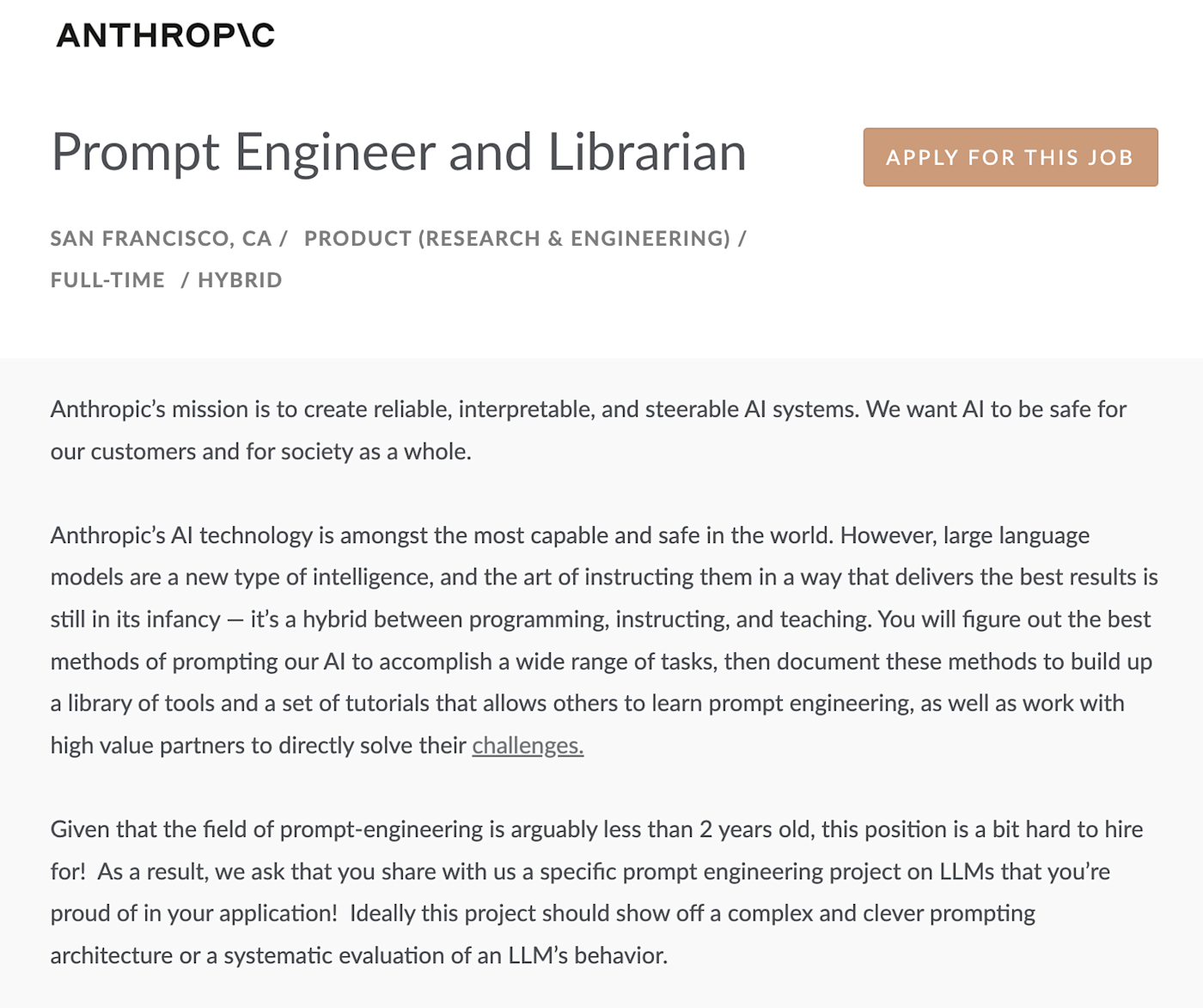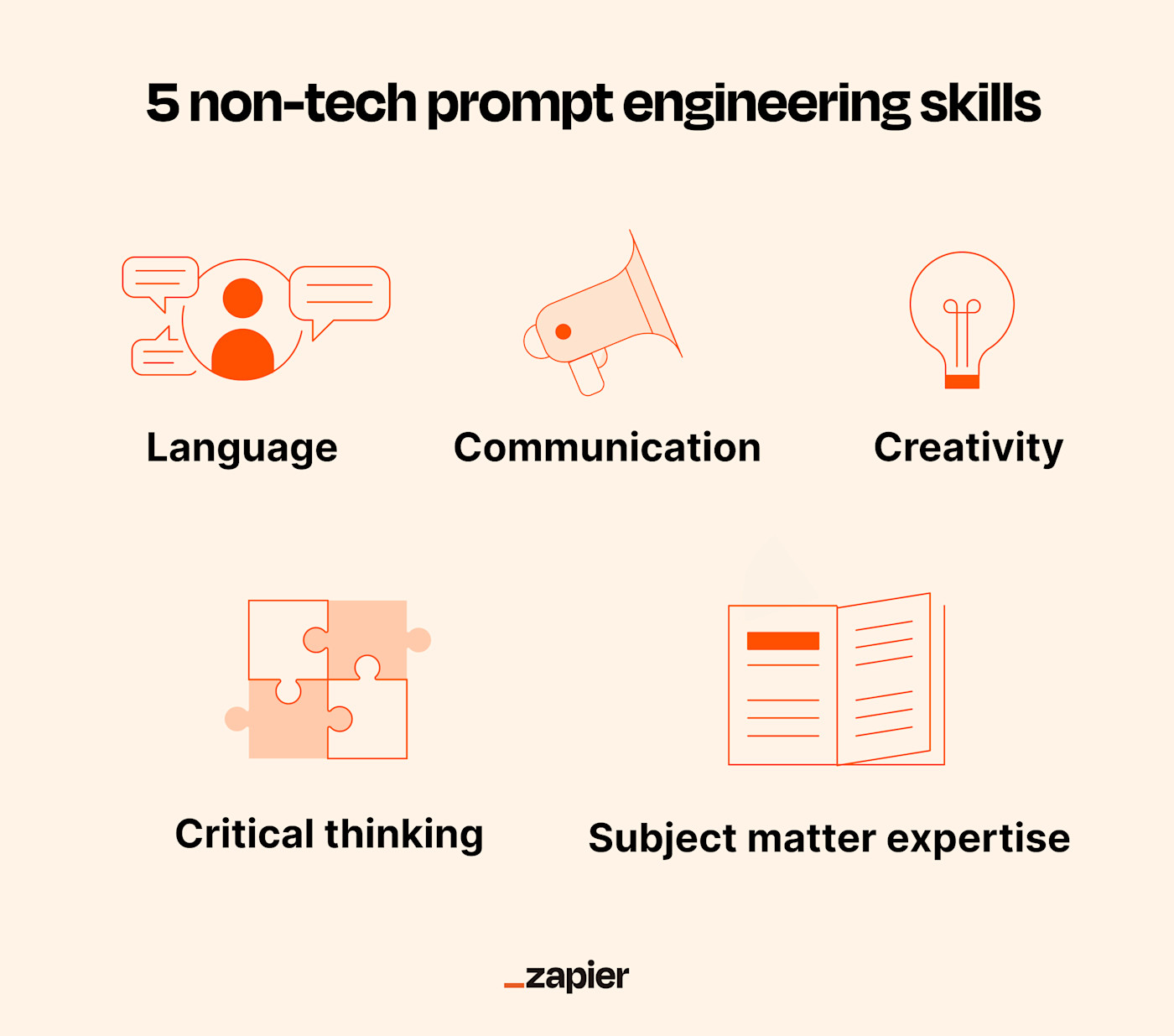Understanding why massive AI models behave the way they do is an art. Even the
most accomplished technical experts can become perplexed by the unexpected abilities of large language models (LLMs), the fundamental building blocks of AI chatbots like ChatGPT.It's not surprising, then, that prompt engineering has emerged as a hot job in generative AI, with some organizations offering lucrative salaries of up to $335,000 to attract top-tier candidates.
But what even is this job?
What is prompt engineering?
Professional prompt engineers spend their days figuring out what makes AI tick. Using carefully crafted prompts, with precise verbs and vocabulary, they take chatbots and other types of generative AI to their limits, uncovering errors or new issues.
Role specifics vary from organization to organization, but in general, a prompt engineer strives to improve machine-generated outputs in ways that are reproducible. In other words, they try to align AI behavior with human intent.
Why prompt engineering isn't strictly for technical people
While exceptional prompt engineers possess a rare combination of discipline and curiosity, when developing good prompts, they also leverage universal skills that aren't confined to the domain of computer science.
The rise of prompt engineering is opening up certain aspects of generative AI development to creative people with a more diverse skill set, and a lot of it has to do with no-code innovations. Tweeting in January 2023, Andrej Karpathy, Tesla's former director of AI, stated that the "hottest new programming language is English."
The hottest new programming language is English
— Andrej Karpathy (@karpathy) January 24, 2023
While some organizations—like the Boston Children's Hospital—have posted job ads seeking prompt engineers with several years of engineering, developer, or coding experience, a strong engineering background isn't always a requirement for the role.
Anna Bernstein, for example, was a freelance writer and historical research assistant before she became a prompt engineer at Copy.ai. And in its job posting for a prompt engineer, Anthropic mentions that a "high level familiarity" with the operation of LLMs is desirable, but that they encourage candidates to apply "even if they do not meet all of the criteria."

In a way, a good prompt engineer compensates for an AI's limitations: AI chatbots can be great at syntax and vocabulary, but have no first-hand experience of the world, making AI development a multidisciplinary endeavor.
Some experts question the value of the role longer term, however, as it becomes possible to get better outputs from clumsier prompts. But there are countless use cases for generative tech, and quality standards for AI outputs will keep going up. This suggests that prompt engineering as a job (or at least a function within a job) won't be going away any time soon.
5 non-tech prompt engineering skills (that you probably already have)
The day-to-day activities of a prompt engineer should be of interest to anyone who interacts with generative AI for two very good reasons: (1) It illuminates the tech's capabilities and limitations. (2) It gives people a good understanding of how they can use skills they already possess to have better conversations with AI.
Here's a look at five non-tech skills contributing to the development of AI technology via the multidisciplinary field of prompt engineering.

1. Communication
Like project managers, teachers, or anybody who regularly briefs other people on how to successfully complete a task, prompt engineers need to be good at giving instructions. Most people need a lot of examples to fully understand instructions, and the same is true for AI.
Edward Tian, who built GPTZero, an AI detection tool that helps uncover whether a high school essay was written by AI, shows examples to large language models, so it can write using different voices.
Of course, Tian is a machine learning engineer with deep technical skills, but this approach can be used by anyone who's developing a prompt and wants a chatbot to write in a particular way, whether it's as a seasoned professional or an elementary school student.
2. Subject matter expertise
Many prompt engineers are responsible for tuning a chatbot for a specific use case, such as healthcare research.
This is why prompt engineering job postings are cropping up requesting industry-specific expertise. For example, Mishcon de Reya LLP, a British Law Firm, had a job opening for a GPT Legal Prompt Engineer. They were seeking candidates who have "a deep understanding of legal practice."
Subject matter expertise, whether it's in healthcare, law, marketing, or carpentry, is useful for crafting powerful prompts. The devil's in the details, and real-world experience counts for a lot when talking with AI.
3. Language
To get the AI to succeed, it needs to be fed with intent. That's why people who are adept at using verbs, vocabulary, and tenses to express an overarching goal have the wherewithal to improve AI performance.
When Anna Bernstein started her job at Copy.ai, she found it useful to see her prompts as a kind of magical spell: one wrong word produces a very different outcome than intended. "As a poet, the role […] feeds into my obsessive nature with approaching language. It's a really strange intersection of my literary background and analytical thinking," she said in this Business Insider interview.
Instead of using programming languages, AI prompting uses prose, which means that people should unleash their inner linguistics enthusiast when developing prompts.
4. Critical thinking
Generative AI is great at synthesizing vast amounts of information, but it can hallucinate (that's a real technical term). AI hallucinations occur when a chatbot was trained or designed with poor quality or insufficient data. When a chatbot hallucinates, it simply spews out false information (in a rather authoritative, convincing way).
Prompt engineers poke at this weakness and then train the bot to become better. For example, Riley Goodside, a prompt engineer at the AI startup Scale AI, got the wrong answer when he asked a chatbot the following question: "What NFL team won the Super Bowl in the year Justin Bieber was born?" He then asked the chatbot to list a chain of step-by-step logical deductions for producing the answer. Eventually, it corrected its own error.
This underscores that having the right level of familiarity with the subject matter is key: it's probably not a good idea for someone to have a chatbot produce something they can't reliably fact-check.
5. Creativity
Trying new things is the very definition of creativity, and it's also the essence of good prompt engineering. Anthropic's job posting states that the company is looking for a prompt engineer who has "a creative hacker spirit," among other qualifications.
Yes, being precise with language is important, but a little experimentation also needs to be thrown in. The larger the model, the greater the complexity, and in turn, the higher the potential for unexpected, but potentially amazing, results.
By trying out a variety of prompts and then refining those instructions based on the results, generative AI users can increase the probability of coming up with something truly unique.
Bring your talents to your prompts
Knowing the techniques and strategies that prompt engineers use helps all types of generative AI users. It gives people a better understanding of how to structure their prompts by leveraging their own creativity, expertise, and critical thinking.
Understanding prompt engineering can also help people identify and troubleshoot issues that may arise in the prompt-response process—a valuable approach for anyone who's looking to make the most out of generative AI.
Related reading: